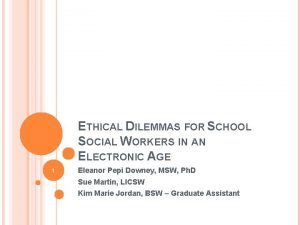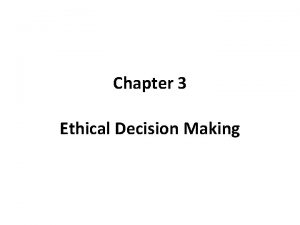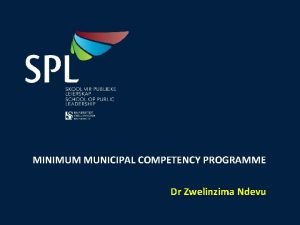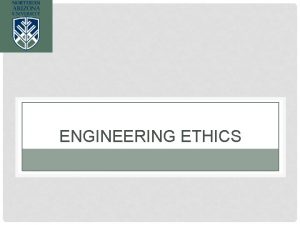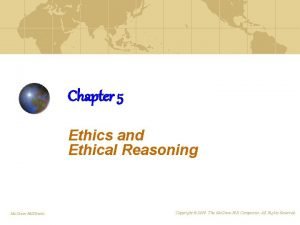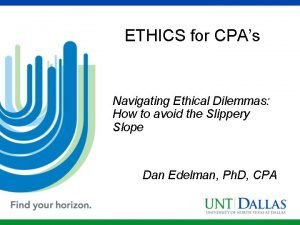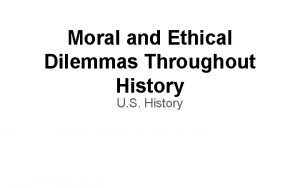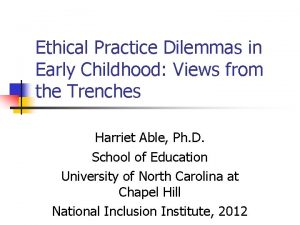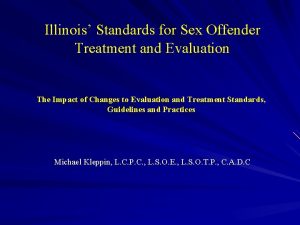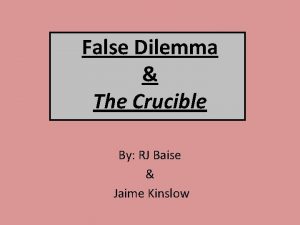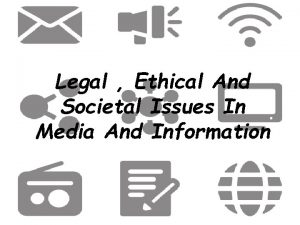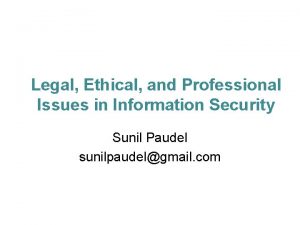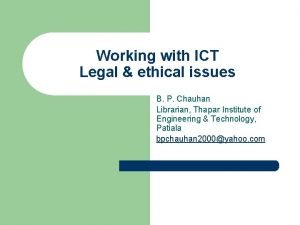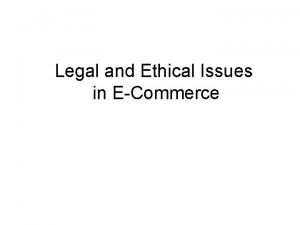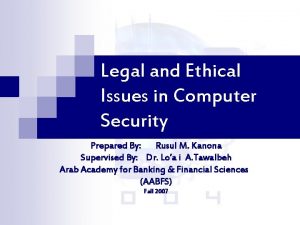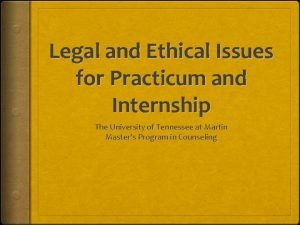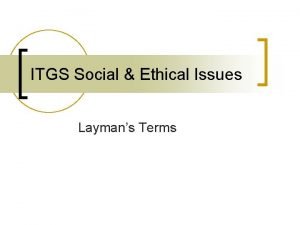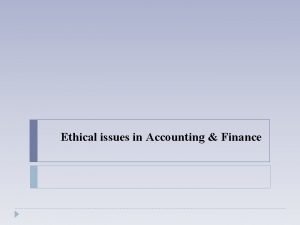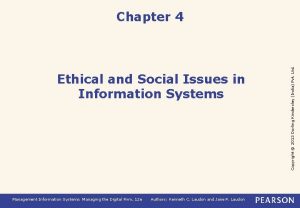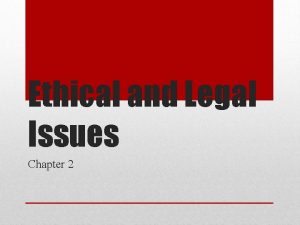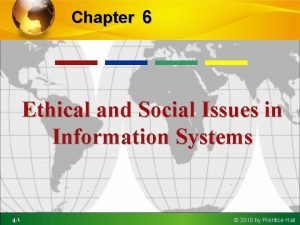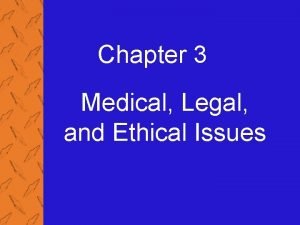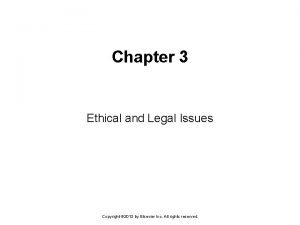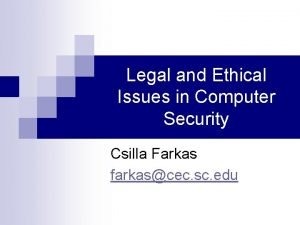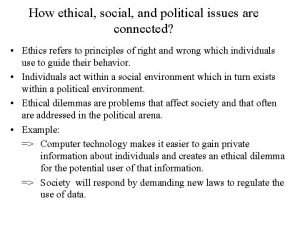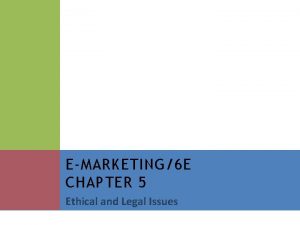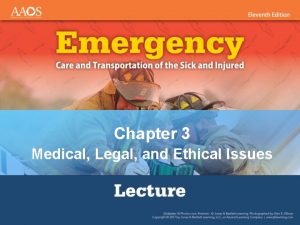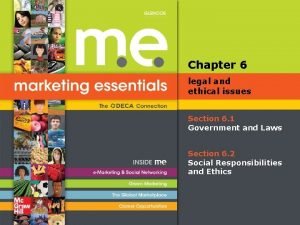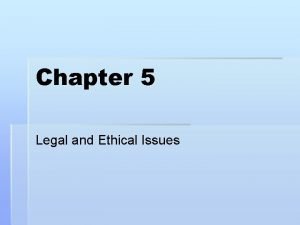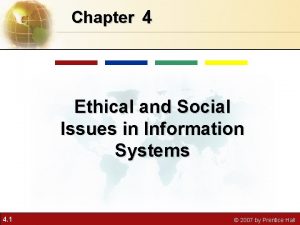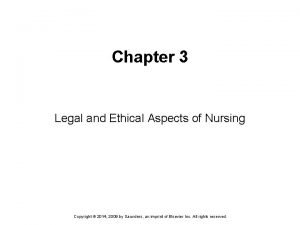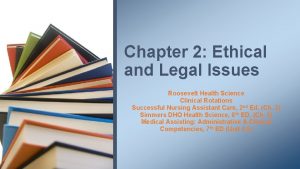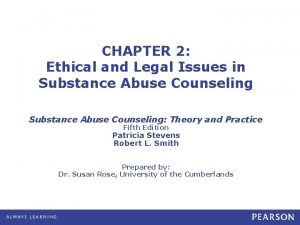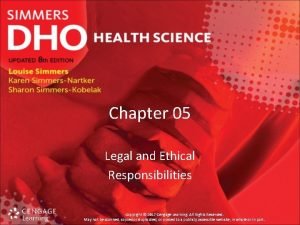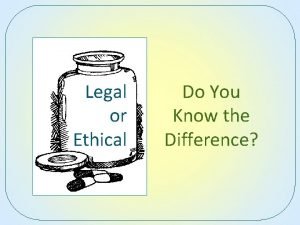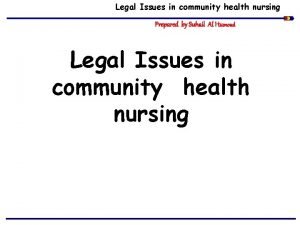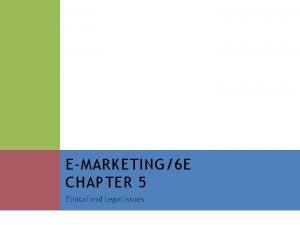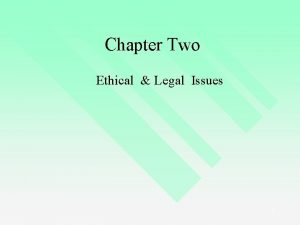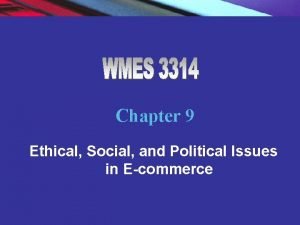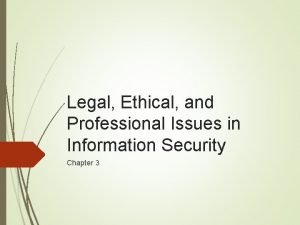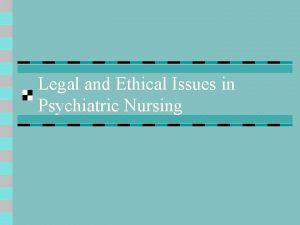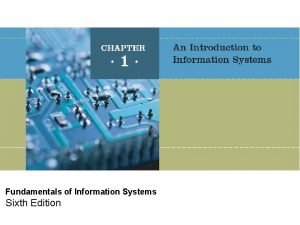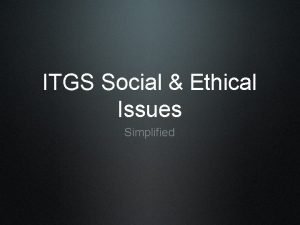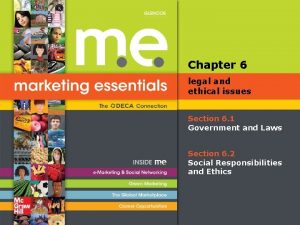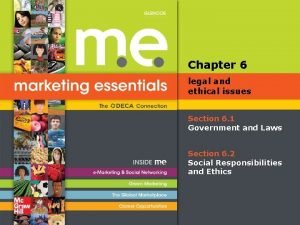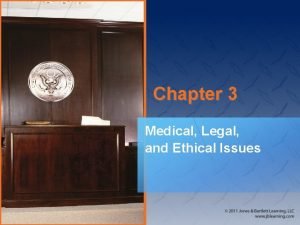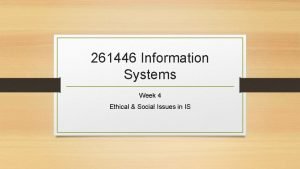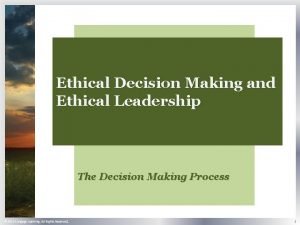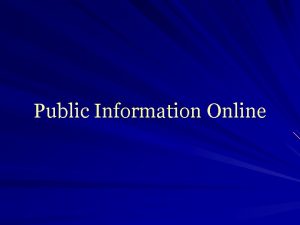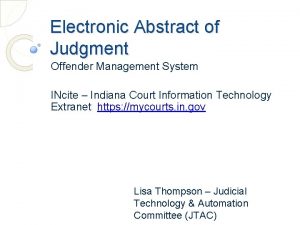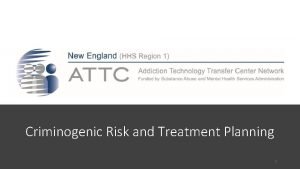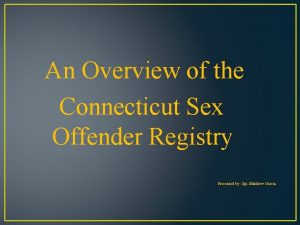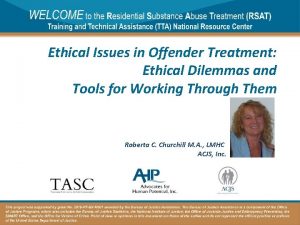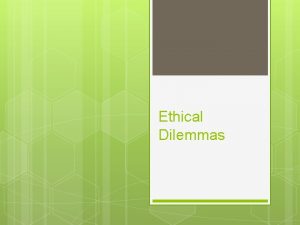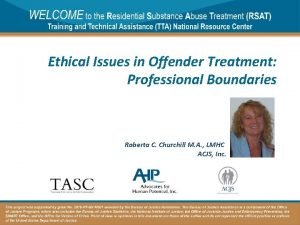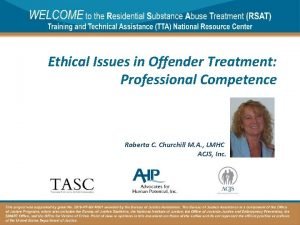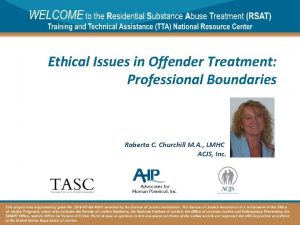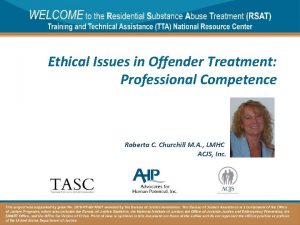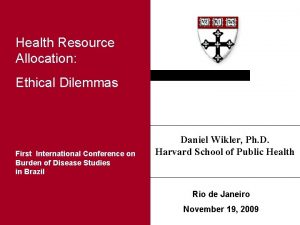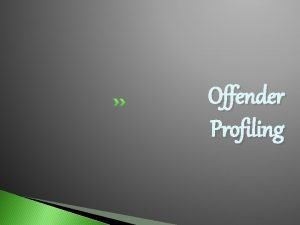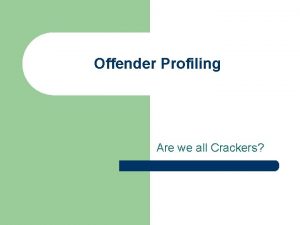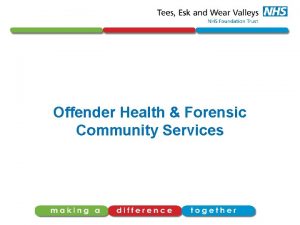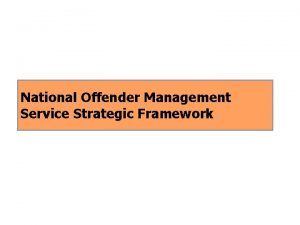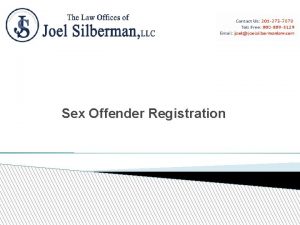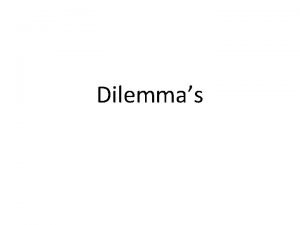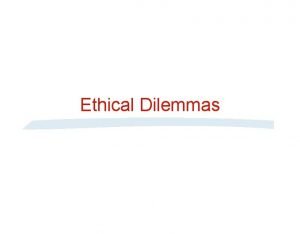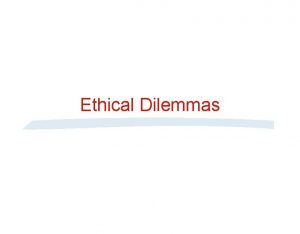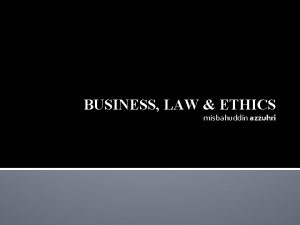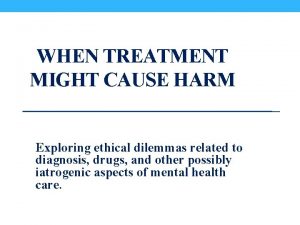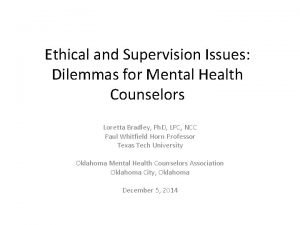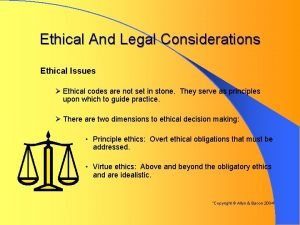Ethical Issues in Offender Treatment Ethical Dilemmas and
























































- Slides: 56

Ethical Issues in Offender Treatment: Ethical Dilemmas and Tools for Working Through Them Roberta C. Churchill M. A. , LMHC ACJS, Inc.

Course Objectives Upon completion of this presentation, participants will be able to : Ø Ø Provide the definition of “ethical dilemma” Describe the six ethical principles for treatment professionals Identify at least three tools of decision making to help with ethical dilemmas Describe one tool of decision making in detail 9/13/2021 2

Ask Yourself Module I: Research What kind of ethical dilemmas have you experienced in the workplace? How have you addressed them? 9/13/2021 3

WHAT IS AN ETHICAL DILEMMA? 4

What is an Ethical Dilemma? Module I: Research The concept of ethics: Rel Ø Ø Assumes that there exists that dimension of human thought and behavior that is guided by … o Standards o Principles o Values …of the “right thing to do” and that have, are and always will provide the foundation for a good life. 9/13/2021 5

What is an Ethical Dilemma? Module I: Research Values: Ø Enduring beliefs that influence our opinions, attitudes, thoughts, feelings , actions and the choices we make 9/13/2021 6

What is an Ethical Dilemma? Module I: Research Values: Ø Enduring beliefs that influence our opinions, attitudes, thoughts, feelings , actions and the choices we make What motivates your ethical practice? 9/13/2021 7

What is an Ethical Dilemma? Module I: Research What is an ethical dilemma? It is a situation which: Ø You are unsure of the right thing to do Ø Two or more of your values may be in conflict Ø Some harm may be caused no matter what you do 9/13/2021 8

What is an Ethical Dilemma? Module I: Research Applicable, and sometimes conflicting, values and moral principles (including those in professional codes of ethics) Applicable, and sometimes conflicting, regulations, polices and procedures. 9/13/2021 9

The BIG Myth Module I: Research Learning ethical standards, principles and guidelines – along with examples of how they have been applied – translates into ethical practice, as long as we: Ø follow our professional codes of conduct Ø understand their relationship to pertinent legal statues and agency regulations 9/13/2021 10

The BIG Myth Module I: Research Strategies used to Justify Behavior as Ethical (whether it Is or Not!) It’s Ethical … • If our agencies / facilities require it • If other people are doing it • As long as it’s legal • As long as our professional association’s code of conduct allows it • As long as we meant well • As long as no one complains about it • If we can find a consultant / trainer who say it’s OK • If it came from the “heart” or “gut” • If “anyone else in the same situation” would have done the same thing 9/13/2021 11

In Response Module I: Research Ø Education – to raise awareness and knowledge to deal with ethical concerns Ø Case Reviews – to identify and articulate ethical issues confronting staff Ø Clinical Supervision – provide opportunity for ethical reflection Ø Policy Development – to help to develop guidelines for ethical practice 9/13/2021 12

SIX ETHICAL PRINCIPLES Remley and Herlihy (2007) 13

Beneficence Module I: Research The responsibility to do good and to contribute to the welfare of the client. Treatment staff are expected to do the best for the client and if unable to assist, to offer alternatives as appropriate. Staff engage in professional activities that provide general benefit to the public. 9/13/2021 14

Non-Maleficence Do no harm. Treatment staff have a responsibility to avoid using interventions that could or have the potential to harm clients. Staff are expected to complete a thorough assessment of the client’s needs and apply appropriately determined and explained interventions. 9/13/2021 15

Autonomy The freedom of clients to choose their own direction. The role of treatment staff is to acknowledge client autonomy and to respect this right. Clients are to be aware of the choice taken and the effect / consequences it has on others and themselves. 9/13/2021 16

Justice To act in a fair and just manner. It is expected that staff will act in a nondiscriminatory manner to individuals and groups. It does not mean treating all individuals the same – rather it relates to equity. 9/13/2021 17

Fidelity Refers to the trust relationship between staff and client. The interests of the client are placed before those of the staff person even if such loyalty is inconvenient or uncomfortable. Clients need to be able to trust that the words and actions of staff are truthful and reliable. 9/13/2021 18

Veracity The principle of truth telling. Staff are obligated to deal honestly with clients and others with whom they relate professionally. This applies to a broad range of issues including documentation standards, community relations, regulatory reporting, and compliance. 9/13/2021 19

Boundaries of Competence Ø Provide only those services for which you are qualified Ø Represent accurately your professional qualifications 9/13/2021 20

Impairment Ø Seek assistance in solving personal issues Ø Refrain from your professional services if a client may be harmed by your physical, mental, or emotional problems 9/13/2021 21

Module I: Research "Because a relationship begins with a power differential, I shall not exploit relationships with current or former clients for personal gain, including social or business relationships. " (National Association of Alcoholism and Drug Abuse Counselors, 2004) 9/13/2021 22

Dual Relationships Module I: Research Ø When staff and client are engaged in relationships other than that of staff-client • Social, professional, sexual / emotional Ø Staff should never engage in any role and/or relationship that may: • Impair their judgment and objectivity • Affect their ability to render effective services • Result in harm and/or exploitation to clients Corey, G. , Schneider-Corey, M. , & Callanan, P. (2011). Issues and ethics in the helping profession (8 th ed. ). Belmont, CA: Brooks & Cole, Cengage Learning. 9/13/2021 23

TOOLS FOR ETHICAL DECISION MAKING 24

Bell, Book and Candle Module I: Research Al The Bell • Do any alarm bells go off in my head as I consider my choice of action? The Book • Does my choice violate any laws, written policies, codes, etc. ? The Candle • Will my decision stand up in the light of day or media spotlight? 9/13/2021 25

Bell, Book and Candle Module I: Research Al The Bell • Do any alarm bells go off in my head as I consider my choice of action? The Book • Does my choice violate any laws, written policies, codes, etc. ? The Candle • Will my decision stand up in the light of day or media spotlight? 9/13/2021 26

Bell, Book and Candle Module I: Research Al The Bell • Do any alarm bells go off in my head as I consider my choice of action? The Book • Does my choice violate any laws, written policies, codes, etc. ? The Candle • Will my decision stand up in the light of day or media spotlight? 9/13/2021 27

Case Scenarios Module I: Research Ø You’re a re-entry case manager working within a jail-based RSAT Program. Your client interview went longer than expected and you’re leaving your shift later than usual. Ø You check to see if the RSAT Program Director is still in her office – she is also a Deputy Superintendent for the facility – and you are shocked by what you see. Ø The PD is in her office with a male RSAT Participant alone, sitting very close together, whispering and it looks as though they are holding hands on her desk. Ø You freeze outside the office door – watch for a few moments and observe their actions become more and more intimate. You rush back out of administrative hallway and punch out for the day. You are sure they did not see you. 9/13/2021 28

Case Scenarios Module I: Research Your dilemma: Do you remain quiet since the RSAT client is not on your caseload? Because it looked like a “consensual” situation? Because she is your supervisor and you feel at a disadvantage within your system? 9/13/2021 29

Bell, Book and Candle Module I: Research l. The Bell • Do any alarm bells go off in my head as I consider my choice of action? If I remain silent: • I am allowing something I know is unethical and potentially dangerous to continue. • Something could go dreadfully wrong in my Program Director’s life if I don’t say / do something! • Who knows what is going on mentally, clinically with the RSAT client? 9/13/2021 If I say something to someone: • I may face retaliation from my Program Director and/or higher-ups • I may earn respect from higher -ups • I may seen as a “snitch” by other RSAT participants • It’s possible whomever I tell won’t believe me? 30

Bell, Book and Candle Module I: Research The Book • Does my choice violate any laws, written policies, codes, etc. ? If I remain silent: • I am NOT adhering to our Department’s policy of going to your supervisor when you see other staff engaged in misconduct. • I am NOT adhering to our RSAT Program’s own Expectations of Conduct! • Would I be “Aiding and Abetting” a sexual assault? 9/13/2021 If I say something to someone: • I can’t think of any codes or laws that I would break if I were to go to someone and let them know about my PD. • Except for the “snitch” code. 31

Bell, Book and Candle Module I: Research The Candle • Will my decision stand up in the light of day or media spotlight? If I remain silent: • I could not hold my head up to anyone … if it were to be known that I knew about this … and said / did nothing. • Maybe I should say something to my PD first – she would be the only person who might appreciate my decision to stay silent and addressing her first. 9/13/2021 If I say something to someone: • I may face criticism by coming forward by some … but by those with integrity – my decision will be respected. • I would have no integrity if I did not say / do something. 32

Ethical Checklist Module I: Research Ethical Checklist Is it legal? • Does my decision violate any laws, directives or policies? Just because it is legal doesn’t mean it is ethical. Is it fair? • Is my decision fair to all? • Does it promote “win-win” outcomes with all stakeholders? • Do I have special information, because of my job, which gives me an unfair advantage over others? • Is there a conflict between serving my interests and those of my organization / the community? How will I feel afterwards? • Will I be able to explain my actions so that my family, agency, and others would be able to understand support my decision? • Would the greater community understand agree with my choice? 9/13/2021 33

Ethical Checklist Module I: Research Ethical Checklist Is it legal? • Does my decision violate any laws, directives or policies? Just because it is legal doesn’t mean it is ethical. How will I feel afterwards? • Will I be able to explain my actions so that my family, agency, and others would be able to understand support my decision? • Would the greater community understand agree with my choice? 9/13/2021 Is it fair? • Is my decision fair to all? • Does it promote “win-win” outcomes with all stakeholders? • Do I have special information, because of my job, which gives me an unfair advantage over others? • Is there a conflict between serving my interests and those of my organization / the community? 34

Ethical Checklist Module I: Research Ethical Checklist Is it legal? • Does my decision violate any laws, directives or policies? Just because it is legal doesn’t mean it is ethical. Is it fair? • Is my decision fair to all? • Does it promote “win-win” outcomes with all stakeholders? • Do I have special information, because of my job, which gives me an unfair advantage over others? • Is there a conflict between serving my interests and those of my organization / the community? How will I feel afterwards? • Will I be able to explain my actions so that my family, agency, and others would be able to understand support my decision? • Would the greater community understand agree with my choice? 9/13/2021 35

Case Scenarios Module I: Research Ø You’re a Treatment Specialist in a RSAT program who also has a private counseling practice in the community. You start giving out your business cards to RSAT inmates who are eligible for parole and begin spending more time with them individually to establish a more therapeutic relationship. Ø Most of your private practice have become released RSAT inmates. You believe it looks good for those inmates that they’re set up with individual counseling when they go up for parole. Ø You also believe you provide the best services once they’re released because you understand them so well. You also have to admit you love the fact that you have a endless source of referrals for your practice. Ø You’ve just found out about an open Re-Entry Case Manager position. This would put you into touch with many more parole eligible inmates within the institution. However, you realize that may have already stepped over some boundaries … 9/13/2021 36

Case Scenarios Module I: Research Your dilemma: Do you go for the Re-Entry Case Worker position where there are many potential referrals for your private practice? Do you re-think your behavior of drumming up referrals from the RSAT program even if you don’t go for the Re-Entry position? 9/13/2021 37

ACT Module I: Research i. ACT A decision making grid A – Alternatives C – Consequence T – Tell your story 9/13/2021 A Alternatives C Consequences T Tell your story 38

Case Scenarios Module I: Research Ø You’re a case manager in a RSAT Program within a DOC facility. You work closely with Parole, and are on good terms with an Officer who is supervising a former successful RSAT Participant in the community. Ø One day you see this former RSAT participant come out of the local convenience store as you walk by with your family. He sees you and starts up a conversation that leads to his admitting that he’s relapsed back to IV heroin use. He is obviously under the influence but aware enough to ask you not to say anything - and walks away saying that he is on his way to a NA meeting right now. Ø No one else know about this. You happen to know that this former RSAT participant lives with his girlfriend and two young kids. You’re worried that they may be at risk as well. 9/13/2021 39

Case Scenarios Module I: Research Your dilemma: Do you follow the absolute practice of confidentiality, although he is no longer your client? Or do you do what you think is right and contact his Parole Officer to ensure that the former RSAT participant and his children are safe? 9/13/2021 40

ACT Module I: Research A Alternatives Tell the truth C Consequences • • Remain silent T Tell your story May harm your relationship with the participant or other You can tell participants your story Could protect participant and his children from possible harm No impact on your relationship with participant or other participants Possible loss of respect from those higher-up if information becomes know You may be haunted for years if something happens to participant or his children You cannot tell your story Lie; pretend you • No impact on your relationship with participant or other participants never heard • Possible loss of respect from those higher-up if information about it You cannot tell your story • • • 9/13/2021 becomes know You may be haunted for years if something happens to participant or his children You are labelled as a liar 41

ACT Module I: Research A Alternatives C Consequences Tell the truth • Remain silent • • Lie; pretend you never heard about it • • 9/13/2021 T Tell your story May harm your relationship with the participant or other participants Could protect participant and his children from possible harm You can tell your story – although it would break codes of confidentiality, you feel you could defend it because it would ensure public safety which is in line with your core values. No impact on your relationship with participant or other participants Possible loss of respect from those higher-up if information becomes know You may be haunted for years if something happens to participant or his children You cannot tell your story – you would be respecting confidentiality but would not feel good about staying true to your higher principles of protecting the public and those without a voice (children) No impact on your relationship with participant or other participants Possible loss of respect from those higher-up if information becomes know You may be haunted for years if something happens to participant or his children You are labelled as a liar You cannot tell your story - you would be respecting confidentiality but would not feel good about staying true to your higher principles of protecting the public and those without a voice (children). You also could not be dishonest about such an important issue. 42

Process for Working out Ethical Issues Module I: Research Process for Working out Ethical Issues - NASW Identify the ethical issues Ethical issues are often revealed when there is confusion, anxiety or uncertainty about what to do next with a client Review what principles are at stake What is the true dilemma? Which basic ethical principle is at stake? Identify the clinical / treatment issues How does the ethical dilemma relate to the clinical / treatment needs of the client? Identify the legal issues Have you reviewed state / local laws regarding the issue? Identify the system issues What are the policies / procedures / regulations of the agency or institution regarding the ethical question? 9/13/2021 43

Process for Working out Ethical Issues Module I: Research Process for Working out Ethical Issues - NASW Identify the cultural issues Cultural issues are significant in understanding the client’s and /or other staff member’s motivation What are the possible options? It is useful to simply list all of the possible options and then examine them Review the pros and cons of each option Note the impact of options of the client, staff, agency and others Act Sometimes the decision may not be one that everyone is comfortable with, but it may be the least objectionable plan Follow up and evaluate An ethical decision should be evaluated and the impact to the client monitored 9/13/2021 44

Case Scenarios Module I: Research Ø You’re a Treatment Manager at a Community-Based Re-Entry Center. You are called to the front where you are informed that a Center participant has left the building without permission. Ø A Correctional Officer who provides supervision and security at the facility relates that Mr. Kareem was not told he could drug test nor could he join his “Co-Occurring Disorders” until he removed his head covering. Ø After a few minutes of verbal sparring, Mr. Kareem left the Center uttering expletives on his way out. The CO is just about to contact Mr. Kareem’s supervising PO in order to get permission to contact local police. Ø The other Correctional Officer, however, provides additional information stating that Mr. Kareem refused to remove his tofi / tuki because it is a religious headdress worn especially during certain days of prayers. While pondering this information, you see Mr. Kareem pacing back and forth in the Center parking lot. 9/13/2021 45

Case Scenarios Module I: Research Your dilemma: Do you follow the rules and regulations of agency policy and contact authorities? Or do you take other factors into account when considering the “right way” to handle the client / staff situation? 9/13/2021 46

Process for Working out Ethical Issues - NASW Module I: Research Identify the ethical issues The issue is whether or not to discipline Mr. Kareem for leaving the Center without permission despite other contributing factors Review what principles are at stake The basic ethical principle of Justice seems to be at stake. “It is expected that staff will act in a non-discriminatory manner to individuals and groups. ” Identify the clinical / treatment issues Mr. Kareem’s anger issues and possible psychotic episodes may have been triggered by his perceived unjust treatment by one of the Center’s COs. Identify the legal issues There are religious freedom protection laws; anti-discrimination laws based on religious beliefs. 9/13/2021 47

Process for Working out Ethical Issues - NASW Module I: Research Identify the system issues Center policy states that clients are not allowed to wear any hats or head covering inside the building. The regulation is in place to discourage gang insignia / affiliation. 9/13/2021 Identify the cultural issues Mr. Kareem is Muslim and has spoken about his beliefs on many occasions. He is one of the older clients who also talks openly about being a former “Black Panther” over 50 years ago. Although compliant with drug testing, he is distrustful of authority figures, is argumentative, and has a penchant for telling stories from his activist days. 48

Process for Working out Ethical Issues - NASW Module I: Research What are the possible options? • Call his Parole Officer / local Police • Consider this more of a crisis intervention – invite Mr. Kareem inside the Center using de-escalation techniques • Call local EMT – consider this more of a medical emergency • Consider this triage / crisis intervention - calmly approach Mr. Kareem in the parking lot and being a conversation Review the pros and cons of each option • Calling Parole / Police would escalate situation; create more distrust between Mr. Kareem and Center staff; could result in violence, increased sanctions; fulfill CO expectations of “bad” offender. • Working with Mr. Kareem from treatment / intervention standpoint provides opportunity for mutual respect, concern, genuine communication, role model apology. Act - Follow up and Evaluate 9/13/2021 49

FINAL CONSIDERATIONS Ethical Decision Making 50

Consider This! It is your Ethical Responsibility to: Ø Be as emotionally healthy as possible Ø Be aware of how your “unfinished business” could potentially influence your work with others Ø Seek professional help as soon as you are aware that some part of your life is infringing on your work 9/13/2021 51

Consider This … Module I: Research It is unethical when treatment staff are primarily meeting their own needs and imposing their personal values in the treatment relationship. Adapted from Robinson Kurpius, S. E. , Dixon, S. K. , & Stauffer, M. D. (2008). Ethics and the beginning counselor: Being ethical right from the start. In Capuzzi, D. , & Gross, D. R. (Eds. ), Introduction to the counseling profession (5 th ed. ) 9/13/2021 52

Ask Yourself Module I: Research “Are my actions more about my needs than about the needs of the client? ” 9/13/2021 53

Accept, Admit, Acknowledge Ø Accept the complexity of ethical dilemmas Ø Admit when you need help Ø Acknowledge your professional limitations and discuss them with colleagues “Whose needs are being met? ” 9/13/2021 “Do no harm. ” 54

References § • • • American Counseling Association. (2005). Code of ethics and standards of practice. Alexandria, VA: Kurpius. Bissell, L. , Royce, J. , (1994) Ethics for Addiction Professionals, Hazelden Educational Materials, Center City, Minnesota. Corey, G. , Corey, M. S. , & Callahan, P. (2007). Issues and ethics in the helping professions (7 th ed. ). Belmont, CA: Brooks/Cole. Mc. Guire, S. (1996) Subtle Boundary Dilemmas: Ethical Decision Making for Helping Professionals, Hazelden Educational Materials, Center City, Minnesota. Capuzzi, D. , & Gross, D. R. (Eds. ), (2005) Introduction to the Counseling Profession (5 th ed. ), Pearson Education, Inc. , Upper Saddle River, New Jersey. Oliver, Carole Robinson (modified 2013) Tools for Working Through Ethical Dilemmas. Let’s Talk, Vol. 32 (No. 2) Correctional Service Canada. Speck, Kate (2013) Resolving Ethical Dilemmas, UN Public Policy Center. Treatment Improvement Protocol (TIP) Series No. 37. Center for Substance Abuse Treatment. Rockville (MD): SAMHSA (US): 2000. White, William L. (2007) Ethical Guidelines for the Delivery of Peer-based Recovery Support Services, ATTCC / SAMHSA Zur, O. (2010) Power in Psychotherapy and Counseling, Online Publication by the Zur Institute. 9/13/2021 55

Next Presentation Trauma-Informed Approaches to Substance Abuse Treatment in Criminal Justice Settings July 8, 2015 (2 nd Wednesday of the month – one time only) 2: 00 – 3: 00 p. m. ET While the vast majority of people with substance abuse histories are trauma survivors, implementing trauma-informed approaches with inmates receiving services in criminal justice settings is extremely challenging. For example, the ability to exercise control over one’s life is key to healing from trauma, but the realities of correctional institutions make this difficult. This presentation will provide an overview of trauma and its impact, and will discuss the prevalence of trauma among people with substance abuse diagnoses and criminal justice involvement. It will describe the hallmarks of trauma-informed approaches to service delivery, and examine ways that these practices can be adapted for implementation in criminal justice settings. Presenter: 9/13/2021 Darby Penney 56
 Once a sex offender always a sex offender
Once a sex offender always a sex offender School social work ethical dilemmas
School social work ethical dilemmas Examples of ethical dilemmas
Examples of ethical dilemmas 5 steps in resolving ethical dilemmas
5 steps in resolving ethical dilemmas Engineering ethical dilemmas
Engineering ethical dilemmas 4 methods of ethical reasoning
4 methods of ethical reasoning Cpa ethical dilemmas
Cpa ethical dilemmas Ethical dilemmas in history
Ethical dilemmas in history Ethical dilemmas in early childhood education
Ethical dilemmas in early childhood education Sexually dangerous persons act illinois
Sexually dangerous persons act illinois Jaime baise
Jaime baise Leadership dilemmas grid solutions
Leadership dilemmas grid solutions Legal, ethical and societal issues in media and information
Legal, ethical and societal issues in media and information Professional issues in cyber security
Professional issues in cyber security Olass - offender learning and skills service
Olass - offender learning and skills service Legal and ethical issues in use of ict
Legal and ethical issues in use of ict Ethical issues in e-commerce
Ethical issues in e-commerce Legal and ethical issues in computer security
Legal and ethical issues in computer security Professional and ethical issues during internship
Professional and ethical issues during internship Social ethical issues itgs
Social ethical issues itgs Ethical issues in accounting and finance
Ethical issues in accounting and finance Social issues in mis
Social issues in mis Chapter 2 ethical and legal issues
Chapter 2 ethical and legal issues Ethical and social issues in information system
Ethical and social issues in information system Medical legal and ethical issues chapter 3
Medical legal and ethical issues chapter 3 Chapter 3 legal and ethical issues
Chapter 3 legal and ethical issues Legal and ethical issues in computer security
Legal and ethical issues in computer security How ethical social and political issues are connected
How ethical social and political issues are connected Legal and ethical issues chapter 5
Legal and ethical issues chapter 5 Medical legal and ethical issues chapter 3
Medical legal and ethical issues chapter 3 Chapter 6 legal and ethical issues
Chapter 6 legal and ethical issues Legal and ethical issues chapter 5
Legal and ethical issues chapter 5 Chapter 4 ethical and social issues in information systems
Chapter 4 ethical and social issues in information systems Nflpn code of ethics
Nflpn code of ethics Chapter 2 ethical and legal issues
Chapter 2 ethical and legal issues Chapter 2 ethical and legal issues
Chapter 2 ethical and legal issues Chapter 5 legal and ethical responsibilities
Chapter 5 legal and ethical responsibilities Ethical and legal issues affecting the nursing assistant
Ethical and legal issues affecting the nursing assistant What is the difference between ethical and legal issues
What is the difference between ethical and legal issues Legal issues in community health nursing
Legal issues in community health nursing Legal and ethical issues chapter 5
Legal and ethical issues chapter 5 Chapter 2 ethical and legal issues
Chapter 2 ethical and legal issues Ethical social and political issues in e-commerce
Ethical social and political issues in e-commerce Legal and ethical issues in information security
Legal and ethical issues in information security Legal issues in psychiatric nursing
Legal issues in psychiatric nursing 4 components of an information system
4 components of an information system Itgs social and ethical issues
Itgs social and ethical issues Chapter 6 legal and ethical issues
Chapter 6 legal and ethical issues Chapter 6 legal and ethical issues
Chapter 6 legal and ethical issues Medical legal and ethical issues chapter 3
Medical legal and ethical issues chapter 3 Ethical and social issues in information systems
Ethical and social issues in information systems Ethical decision making and ethical leadership
Ethical decision making and ethical leadership Prashant chopra sex offender
Prashant chopra sex offender Incite indiana court
Incite indiana court Pcra offender section answers
Pcra offender section answers Offender workforce development specialist
Offender workforce development specialist Ct sexual offender registry
Ct sexual offender registry

